Top Rankings
Cape Flattery School District ranks among the top 20% of public school district in Washington for:
Category
Attribute
Graduation Rate
Highest graduation rate (Top 20%)
Diversity
Most diverse schools (Top 1%)
For the 2025 school year, there are 2 public middle schools serving 315 students in Cape Flattery School District. This district's average middle testing ranking is 2/10, which is in the bottom 50% of public middle schools in Washington.
Public Middle Schools in Cape Flattery School District have an average math proficiency score of 18% (versus the Washington public middle school average of 36%), and reading proficiency score of 36% (versus the 51% statewide average).
Minority enrollment is 86% of the student body (majority American Indian), which is more than the Washington public middle school average of 50% (majority Hispanic).
Overview
This School District
This State (WA)
# Schools
4 Schools
800 Schools
# Students
493 Students
302,560 Students
# Teachers
39 Teachers
16,189 Teachers
Student : Teacher Ratio
13:1
13:1
District Rank
Cape Flattery School District, which is ranked within the bottom 50% of all 306 school districts in Washington (based off of combined math and reading proficiency testing data) for the 2021-2022 school year.
The school district's graduation rate of 90% has stayed relatively flat over five school years.
Overall District Rank
#233 out of 307 school districts
(Bottom 50%)
(Bottom 50%)
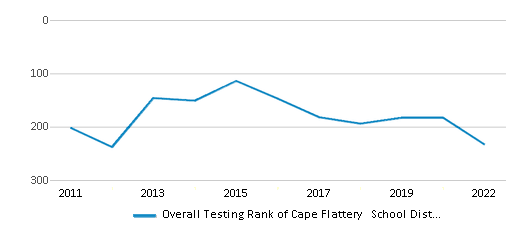
Math Test Scores (% Proficient)
28%
40%
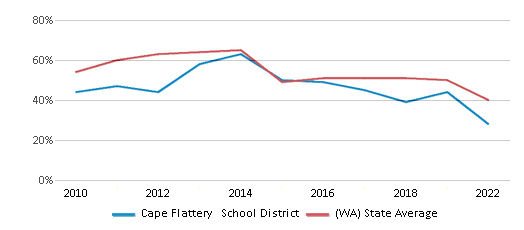
Reading/Language Arts Test Scores (% Proficient)
38%
53%
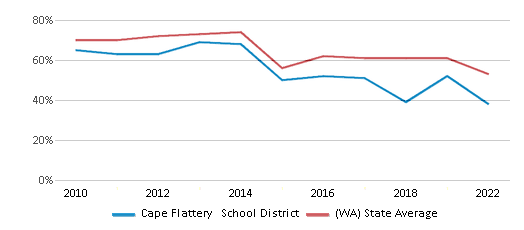
Science Test Scores (% Proficient)
30-34%
49%
Graduation Rate
≥90%
84%
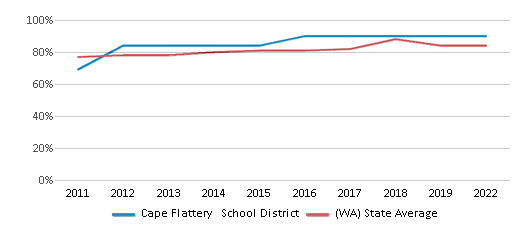
Students by Ethnicity:
Diversity Score
0.68
0.68
# American Indian Students
236 Students
5,703 Students
% American Indian Students
48%
2%
# Asian Students
3 Students
23,666 Students
% Asian Students
1%
8%
# Hispanic Students
105 Students
73,370 Students
% Hispanic Students
21%
25%
# Black Students
1 Student
13,426 Students
% Black Students
n/a
5%
# White Students
48 Students
148,736 Students
% White Students
10%
50%
# Hawaiian Students
n/a
3,970 Students
% Hawaiian Students
n/a
1%
# Two or more races Students
100 Students
26,275 Students
% of Two or more races Students
20%
9%
Students by Grade:
# Students in PK Grade:
3
1,563
# Students in K Grade:
43
3,945
# Students in 1st Grade:
26
4,184
# Students in 2nd Grade:
32
4,295
# Students in 3rd Grade:
50
4,473
# Students in 4th Grade:
37
4,820
# Students in 5th Grade:
38
7,072
# Students in 6th Grade:
38
71,936
# Students in 7th Grade:
45
81,343
# Students in 8th Grade:
44
82,029
# Students in 9th Grade:
33
11,117
# Students in 10th Grade:
35
8,145
# Students in 11th Grade:
41
8,299
# Students in 12th Grade:
28
9,339
# Ungraded Students:
-
-
District Revenue and Spending
The revenue/student of $26,813 is higher than the state median of $18,796. The school district revenue/student has grown by 5% over four school years.
The school district's spending/student of $24,669 is higher than the state median of $19,246. The school district spending/student has grown by 5% over four school years.
Total Revenue
$13 MM
$20,715 MM
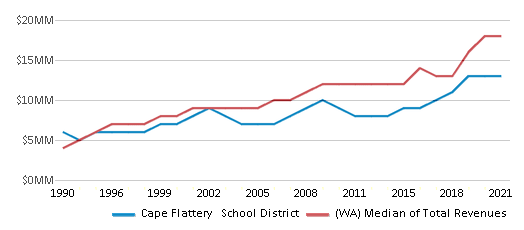
Spending
$12 MM
$21,212 MM
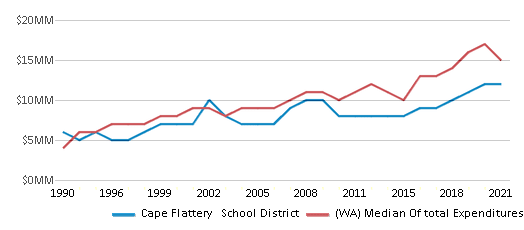
Revenue / Student
$26,813
$18,796
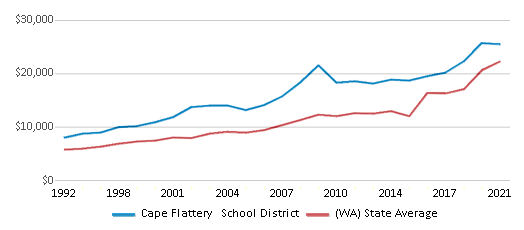
Spending / Student
$24,669
$19,246
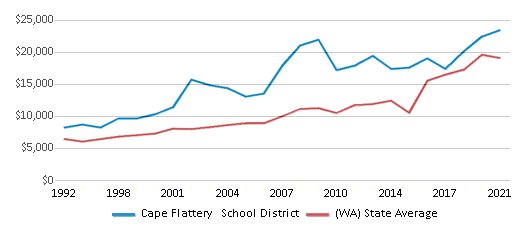
Best Cape Flattery School District Public Middle Schools (2025)
School
(Math and Reading Proficiency)
(Math and Reading Proficiency)
Location
Grades
Students
Rank: #11.
Clallam Bay High & Elementary School
(Math: 25-29% | Reading: 40-44%)
Rank:
Rank:
3/
Bottom 50%10
16-933 Hwy 112
Clallam Bay, WA 98326
(360) 963-2324
Clallam Bay, WA 98326
(360) 963-2324
Grades: K-12
| 119 students
Rank: #22.
Neah Bay Junior/ Senior High School
(Math: 10-14% | Reading: 30-34%)
Rank:
Rank:
1/
Bottom 50%10
3560 Deer Street
Neah Bay, WA 98357
(360) 645-2221
Neah Bay, WA 98357
(360) 645-2221
Grades: 6-12
| 196 students
Recent Articles

Year-Round Or Traditional Schedule?
Which is more appropriate for your child? A year-round attendance schedule or traditional schedule? We look at the pros and cons.

Why You Should Encourage Your Child to Join a Sports Team
Participating in team sports has a great many benefits for children, there is no doubt. In this article you will learn what those benefits are.

White Students are Now the Minority in U.S. Public Schools
Increasing birth rates among immigrant families from Asia and Central and South America, combined with lower birth rates among white families, means that for the first time in history, public school students in the United States are majority-minority. This shift in demographics poses difficulties for schools as they work to accommodate children of varying language abilities and socio-economic backgrounds.





